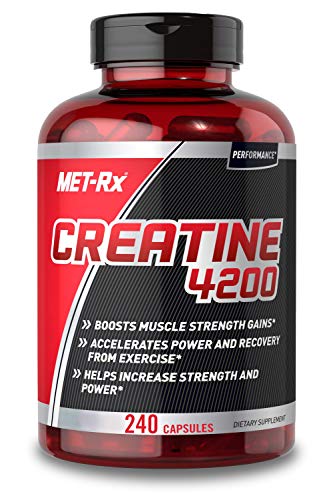Creatine is an amino acid that’s naturally produced and primarily found in the muscles, although the brain, liver, kidneys, and pancreas also produce it. It plays a key role in making adenosine triphosphate (ATP), our body’s natural energy source. If taken correctly, creatine increases energy stores and enhances the intensity of workouts. Athletes use creatine supplements to boost athletic performance and build muscle mass. However, athletes aren’t the only ones who benefit from creatine supplements. Certain medical conditions can lead to creatine deficiency. There’s also evidence that a creatine supplement can counteract the bone and muscle loss associated with aging.
We reviewed dozens of non-powder creatine supplements. We looked at creatine type, the formula, and how those both balanced with price. Our top five provides some great options that can take your fitness to the next level.
Crazy Muscle ThreeAtine has three types of creatine in its formula—creatine monohydrate, creatine pyruvate, and creatine alpha-ketoglutarate (AKG). This mix of creatines enhances absorption and reduces digestive irritation in some users. ThreeAtine also allows you to skip a “loading phase,” so you can start boosting your workouts right away. And, the full dose of 5,001 mg is at the top of the safe recommended daily dose.
In This Article
The 5 Top-Rated Creatine Supplements
| Editor's Picks | Brand | Rating |
|---|---|---|
| Best Overall | Crazy Muscle ThreeAtine | 4.7 |
| Runner Up | Optimum Nutrition Creatine 2500 Caps | 4.4 |
| Best Budget Buy | MET-Rx Creatine 4200 Supplement | 4.3 |
| Best Creatine Supplement Capsules | EFX Sports Kre-Alkalyn | 4.5 |
| Best Creatine Supplement Tablets | Kreatin(TM) | 3.9 |
*Ratings are from Amazon at the time of publication and can change
Our Top Pick: Crazy Muscle ThreeAtine
As far as non-powder creatine supplements go, it’s hard to beat Crazy Muscle ThreeAtine. ThreeAtine contains three types of creatine—creatine monohydrate, creatine pyruvate, and AKG. This mix of creatines is designed to increase the rate of absorption and reduce the bloating and digestive discomfort that often accompanies pure creatine monohydrate.
Each ThreeAtine tablet contains 1,667 mg of creatine, but you have to take three tablets for a full 5,001 mg dose. The tablet form reduces your chances of filling your body with the artificial flavors and dyes found in some of the powdered forms of creatine. There are no animal by-products. There’s no need to adjust the dosage based on gender as it’s designed for use by either gender.
ThreeAtine is a popular supplement for athletes, but they’re not the only ones who’ve benefitted from it. Seniors have successfully used it to maintain their bone health and muscle mass.
Crazy Muscle ThreeAtine Key Features:
- Three types of creatine: creatine monohydrate, creatine pyruvate, AKG
- 1,667 mg of creatine per tablet with a three (3) tablet 5,001 mg dosage
- No animal by-products
Our Runner Up Pick: Optimum Nutrition Creatine 2500 Caps
Our Runner Up Pick, Optimum Nutrition Creatine 2500 Caps, skips mixing creatines for a pure micronized creatine monohydrate capsule. The particles in micronized creatine are up to 20 times smaller than normal. Creators of micronized formulas claim that the smaller particles are easier for the body to absorb. However, those claims have not been substantiated with scientific evidence. Whether or not the creatine in Optimum Nutrition gets absorbed faster than average or not, it still gets absorbed and can successfully enhance energy and muscle production.
Each capsule contains 1,250 mg with a recommended dose of two capsules. Optimum Nutrition’s capsules are large, almost as long as a quarter. While they’re easy to take with you on the go, if you have trouble swallowing pills, you might need a supplement with smaller tablets or capsules.
Optimum Nutrition Creatine 2500 Caps Key Features:
- Micronized creatine
- 1,250 mg capsules
- Two (2) capsule 2,500 mg per dose
Best Budget Pick: MET-Rx Creatine 4200 Supplement
The MET-RxCreatine 4200 Supplement contains HPLC creatine monohydrate. Creatine that’s gone through high-pressure liquid chromatography (HPLC) has been broken down into the smallest possible particles to enhance absorption, much like micronized formulas. Again, the smaller particles are said to absorb easier and faster. While these claims aren’t substantiated through scientific evidence, the creatine is still successfully absorbed by the body.
Each capsule contains 800 mg of creatine. That means to get the manufacturer’s recommended dosage you’ll need to take six capsules for a full dose. It’s also recommended to take the capsules with a liquid that contains glucose to aid absorption.
MET-Rx Creatine 4200 Supplement Key Features:
- Affordable price
- 800 mg capsules
- Six (6) capsule dosage
Best Creatine Supplement Capsules: EFX Sports Kre-Alkalyn
EFX Sports Kre-Alkalyn uses kre-alkalyn creatine, a buffered type of creatine. This newer form of creatine doesn’t need a loading phase, which makes it quicker and easier for some people to use. Creatine can cause some bloating and digestive discomfort. The alkaline content of buffered creatine is designed to counteract that problem by changing the pH balance. This change makes a difference for some users but not others. If you’re highly susceptible to the discomfort associated with creatine, a formula like this one may be a good alternative.
EFX Sports capsules have 750 mg of creatine per capsule with a recommended two capsule dose for a total of 1,500 mg of creatine per dose. That’s a lower dosage than other capsules and tablets, which could also explain why there’s less cramping and bloating with this formula. However, many users report that it produces good results without the unpleasant side effects of other creatine sources.
EFX Sports Kre-Alkalyn Key Features:
- 750 mg per capsule with a two (2) capsule dose
- Buffered creatine for less cramping
- Easy-to-swallow capsules
Best Creatine Supplement Tablets: Kreatin(TM)
The Kreatin(TM) tablets contain a mix of creatine monohydrate, creatine pyruvate, and AKG. This mix of creatines provides the building blocks for increased energy before and during workouts while promoting an increase in muscle mass. The majority of the pills are creatine monohydrate, which has been more frequently tested than any other form of creatine. Its inclusion in this formula boosts the tablets’ effectiveness.
Each tablet contains roughly 1,660 mg of creatine with a recommended three tablet dose for a total of 5,000 mg per dose. A one bottle supply has enough creatine tablets to last thirty days based on the recommended dosage and a five-day per week workout schedule. Users report increased strength and muscle mass in the first week of use.
Kreatin(TM) Key Features:
- 1,660 mg creatine per tablet with a three (3) tablet dosage
- Tri-phase formula with three types of creatine
- Produces results within one week of use
Who Should Buy a Creatine Supplement
Creatine supplements are taken for a variety of reasons. Bodybuilders are the most frequent users as creatine boosts energy by improving the production of ATP, your body’s basic source of energy. The increase in ATP associated with high creatine levels allows you to increase the number of reps you can do, which in turn builds more muscle mass. Increased creatine levels also fuel the quick, explosive movements performed in many competitive sports. Athletes may use it before a competition to enhance their performance.
Your body naturally makes creatine in the muscles and brain. Most people maintain healthy creatine levels simply by eating a balanced diet. Creatine is also naturally found in common protein sources like red meat, chicken, and fish. However, those who follow a strict vegan or vegetarian diet may benefit from a creatine supplement as they may not get enough creatine from their diet alone.
Creatine levels sometimes decrease with age, which can affect the ability to reason and think as well as affect bone density and muscle mass. There’s evidence that taking a creatine supplement can counteract some of these age-related changes.
There are circumstances under which you shouldn’t take creatine. Creatine causes cells to retain water and puts more pressure on the kidneys. If you have kidney disease or at risk of kidney disease, creatine should be avoided. You should also avoid creatine if you’re taking any NSAIDS like ibuprofen and naproxen because they, too, put extra stress on the kidneys.
Important Features to Consider
Creatine should be easy to take, and with the right type, easy for your body to absorb. Here’s what to consider when selecting a creatine supplement:
- Type of creatine. There are many types of creatine. The most common include: creatine monohydrate, creatine pyruvate, creatine hydrochloride, create ethyl ester, buffered creatine, and micronized creatine, creatine alpha-ketoglutarate (AKG), and creatine chelates. Creatine monohydrate leads the pack and is the subject of most scientific studies. The other forms are designed to improve absorption or reduce the side effects associated with creatine monohydrate like bloating, cramping, and excess water weight. However, in the few comparison studies done among the different creatine types, no one source or type has been found superior to the others. All seem to be about equal in their absorption rates. It’s more about finding the type that works best with your unique body chemistry, goals, and needs.
- Supplement form. Non-powder creatine supplements come in capsules, tablets, liquids, and chews. The main benefits of choosing a non-powder creatine over a powder are the ease of use and portability. You don’t have to mix or measure this type of supplement. Whatever form is the easiest for you to take is the one that’s right for you. Manufacturers of each type will claim that theirs improves the absorption speed and rate. However, evidence shows they’re all about equal. Base your decision on which one works best and is easiest for you to use.
- Ease of use. Supplements aren’t difficult to use, but some forms do require specific instructions to maximize their benefits. For example, some creatine supplements need to be “loaded” for several days or weeks before you switch to a maintenance dosage. The loading phase increases the amount of creatine the muscles can hold. It requires taking up to 20 g of creatine a day for several days or weeks to “load” the muscles with creatine before starting harder workouts. After this period, you reduce the dosage to around 5 g or 5,000 mg per day. Other creatine supplements can be taken without a loading period, which makes them easier to start right away. However, most manufacturers have recommendations about how and when the supplement should be taken, such as pre or post-workout or with a glucose-laden drink.
Frequently Asked Questions
What is a creatine supplement, and how does it work?
Creatine is an amino acid that your body naturally makes from other amino acids. It’s also naturally found in meats and seafood, so most people produce and ingest enough of it on their own. The muscles store creatine for use during quick, high-intensity movements, hence its use for powerlifting, sprinting, and bodybuilding. Creatine helps your body produce ATP, the body’s primary energy source. The amount of ATP the body holds is relatively small. Once the ATP is gone, the body has to produce more. If your muscles are loaded with creatine, it can replace ATP faster, so you can work out longer and harder.
What are the benefits of taking creatine?
Muscles loaded with creatine can make more ATP at a higher rate, so you can increase bursts of speed or lift more weight than you would without the extra creatine. Consequently, creatine supplements can increase muscle fiber growth and strength while boosting the ability to maintain intense workouts. Creatine can also boost energy levels for those low in creatine like strict vegans and vegetarians who do not eat natural sources of creatine. Creatine levels drop with age, so creatine supplements can also improve reasoning and muscle tone for the elderly. There’s also evidence that skin creams with creatine can reduce the visible signs of aging.
What are the side effects of creatine?
Creatine does come with some side effects. The most common being:
- muscle cramps
- upset stomach
- diarrhea
- dizziness
- digestive pain
- dehydration
- weight gain
- water retention
Creatine expands the ability of individual cells to hold water, so the weight gain that results from creatine is not fat related but due to water retention. That extra water retention can put a heavier load on those prone to kidney issues or with conditions that affect the kidneys. Anyone with these problems should not take creatine supplements.
Are creatine supplements safe?
Creatine supplements may cause some discomfort, but overall, they’re safe. In fact, creatine is one of the most tested supplements on the market. Athletes or those with a creatine deficiency are the most likely to benefit from taking one. If you’re not doing intense workouts, you may not notice a huge benefit, but taking the supplement won’t hurt you. However, creatine is not for everyone. As we just mentioned, it’s not recommended for those with kidney problems.
Other Creatine Supplements We Reviewed
We looked at 20 other non-powder creatine supplements. While these didn’t make our five best list, they’re still some effective options that might work for you. We’ve also included information to help you compare them.
- Creatine Supplement Capsules
- Creatine Supplement Tablets
- Liquid Creatine Supplements
- Creatine Supplement Chews
Creatine Supplement Capsules
Fitness Labs Creapure German Creatine
Each capsule contains creatine monohydrate manufactured in Germany.
Key Features:
- Contains creatine monohydrate
- 1,000 mg per capsule with a suggested five (5) capsule dose
- No fillers or binders
Cost: $24
GNC Pro Performance Monohydrate
GNC uses a simple formula of creatine monohydrate to pump up muscles.
Key Features:
- Full does = 3,500 mg, but requires five (5) capsules
- 700 mg per capsule
- Includes a 30-day money-back guarantee when purchased from GNC
Cost: $15
Jarrow Formulas Creatine Monohydrate Capsules
Made with HPLC technology, these capsules contain 800 mg of creatine.
Key Features:
- Contain creatine monohydrate
- Made with HPLC technology for smaller particles
- Made in Germany
Cost: $5
Life Extension Creatine Vegetarian Capsules
This formula works for strict vegetarians and still provides 879 mg of creatine per dose.
Key Features:
- Low dosage
- Contains creatine monohydrate
- Also provides a dose of vitamin C
Cost: $8
Muscle Feast Creapure Creatine Monohydrate Capsules
It takes four capsules to make one 3,000 mg dose of this creatine monohydrate formula.
Key Features:
- Vegan capsule
- Four (4) capsules to make one 3,000 mg dose
- Contains creatine monohydrate
Cost: $16
Natural Sport Creatine 5000 Vegetarian Capsules
This vegetarian-friendly formula requires six (6) capsules to get a full dose.
Key Features:
- A full six (6) capsule dose provides 5,000 mg of creatine
- Vegetarian formula
- 30 doses per bottle
Cost: $15
NOW Sports Nutrition Creatine Monohydrate
You’ll need six capsules to get the full 4,500 mg dose of creatine monohydrate.
Key Features:
- Six (6) capsules per 4,500 mg dose
- Packaged in the USA
- No artificial colors
Cost: $8
Nutricost Creatine Monohydrate Capsules
This creatine monohydrate formula contains 750 mg of creatine in each capsule.
Key Features:
- Contains creatine monohydrate
- 750 mg per capsule, requires four (4) capsules per dose
- Non-GMO and gluten-free
Cost: $21
Six Star Elite Creatine X3 Micronized Creatine Pills
A mix of creatines, alpha-lipoic acid, and L-carnosine boosts more than just energy production.
Key Features:
- Contains three creatines—creatine monohydrate, creatine phosphate, creatine pyruvate
- Three (3) capsules per dose
- Micronized particles
Cost: $8
Sports Food Creatine Ethyl Ester
Sports Food capsules are easier to swallow than many other non-powder creatine supplements.
Key Features:
- Three (3) capsules to get a 3,000 mg dose
- Contains creatine ethyl ester
- Easy to swallow capsules
Creatine Supplement Tablets
As the name implies, this formula mixes three types of creatine to boost performance, muscle mass, and energy stores.
Key Features:
- Contains creatine monohydrate, creatine HCL, creatine pyruvate
- Each tablet contains 1,660 mg of creatine, requires three (3) tablets for a full dose
- Recommended to take in four to six-week cycles
Cost: $11
Best Naturals Creatine Monohydrate
Each tablet contains 1,000 mg of creatine monohydrate. This formula also skips unnatural additives.
Key Features:
- 1,000 mg tablets, requires three (3) tablets per dose
- Contains creatine monohydrate
- No artificial color or preservatives
Cost: $13
Clinical Daily Natural Creatine Monohydrate Tablets
Clinical Daily produces a creatine tablet with three forms of creatine—creatine monohydrate, AKG, and creatine pyruvate.
Key Features:
- Contains creatine monohydrate, AKG, and creatine pyruvate
- A full dose consists of four (4) tablets for a total of 5,000 mg creatine
- Micronized formula
Cost: $15
Purity Products EverStrong Creapure Creatine
Purity Products packs more than creatine into their formula. They include vitamin D, coffeeberry, and boron too.
Key Features:
- Contains creatine monohydrate
- Requires four (4) tablets per dose
- Also includes vitamin D, coffeeberry, and boron
Cost: $40
Creatine hydrochloride makes up the majority of this supplement, but it also provides some calcium for an extra nutrient boost.
Key Features:
- Made with creatine hydrochloride
- Includes calcium
- Two (2) tablet dosage
Liquid Creatine Supplements
This liquid formula is taken under the tongue. It’s simple and fast to use, and you get all the benefits of a traditional creatine supplement.
Key Features:
- Easy dropper dosage and two (2) flavor options
- Contains creatinol-o-phosphate, B12, and glucosamine sulfate
- Does not require loading
Cost: $40
MMUSA uses creatine ester HCL and enhances it with enzymes and antioxidants in this muscle-boosting serum.
Key Features:
- Easy dropper dosage and two (2) flavor options
- Contains calcium, carnitine, and other additives to boost ATP production
- Utilizes creatine ester HCL
Cost: $27
Designed specifically for the energy needs of runners, this serum contains creatine ester HCL.
Key Features:
- Contains creatine ester HCL
- Easy dropper dosage and two (2) flavor options
- Does not require loading
Cost: $30
Muscle Marketing USA Xtra Advantage Creatine Serum
This liquid is not only easy to use, but you don’t have to load.
Key Features:
- One dose provides 2,500 mg of creatine monohydrate
- 2-year shelf life
- Easy-to-use dropper
Creatine Supplement Chews
Universal Nutrition Creatine Monohydrate Chews
If you’d rather skip powders, pills, or liquids, there are chews. They’re easy to take and come in two flavors.
Key Features:
- Made creatine monohydrate
- Contains 4 g of sugar
- Two (2) flavors— grape and orange
Cost: $16
































